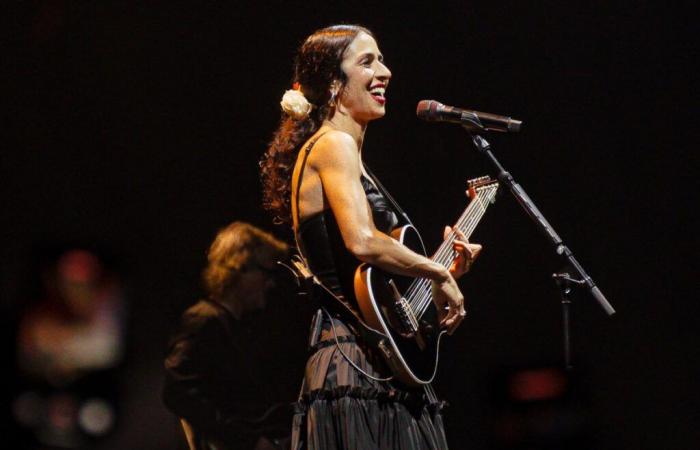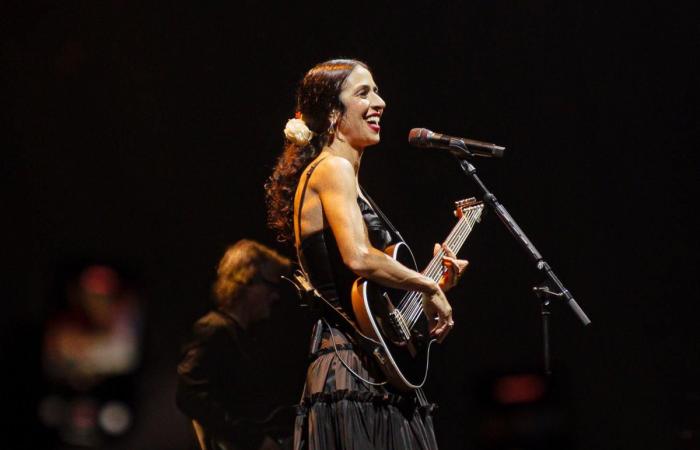One of the greatest voices of “popular Brazilian music” looked back on his entire career during a sold-out concert on Sunday evening in Paris. With flawless elegance.
Marisa went on stage at the Grand Rex last night in Paris. Photo Diego Cogo
By Anne Berthod
Published on November 4, 2024 at 5:05 p.m.
Au Brazil, she has the aura of a Maria Bethânia or a Gal Costa (disappeared in 2022). In France, her name remains unknown to the general public, but she sells out each of her appearances, attracting an audience of adoring compatriots and a few enlightened amateurs. Two years after triumphing at the Salle Pleyel, in the wake of an album praised by critics (Doors), singer Marisa Monte, one of the greatest voices of Brazilian popular music, performed on Sunday, November 3 at the Grand Rex, a Parisian venue that she knows well, as part of her “Greatest Hits” tour: a marathon of around twenty dates in one month, most of them sold out, for which the press, lacking a record to promote, was invited in dribs and drabs.
A few days earlier, the artist's manager had warned: “The concerts are too close together, Marisa doesn't give interviews, she preserves her voice. » We understand her, this is perhaps her most beautiful thing, a limpid, melodious and luxuriant voice, experienced in lyrical singing, which she left to study in Italy when she was 19 years old. That was before she was spotted in a Roman bar by producer Nelson Motta. Before her return to the country and she laid the foundations, in a first album (1989) recorded live at the age of 22, of her eclectic style, nourished by pop, jazz, soul and samba.
A free and adventurous woman
The theatrical outfit in which the carioca diva appears on stage, quite majestic, is a reflection of this syncretism. As often, she is in black, the chic black of Callas, the first muse of her youth, whose disarming smile she also has. Undulating in her long ruffled skirts, Marisa Monte is otherwise bohemian. With her lace bolero, her flamenco hat, the two bright flowers stuck in her jet-black hair, she looks more like a Sevillian dancer than a bel canto queen.
Discover the rating and review
“reEncanto”, the sensual acoustic serenity of Mayra Andrade
“Overturned trains, crazy and moving passion / In directions, programmed and framed, I will wait romantic”, she sings at the opening of her recital. She camps there real Mary of the song composed in the early 1990s by the Bahian Carlinhos Brown. An abstract figure, this Maria represented a magician, a romantic, a free and adventurous woman, at a time when she herself mingled with adventurous spirits such as Carlinhos Brown, Arnaldo Antunes or Nando Reis, and collaborated closely with the New York guitarists Arto Lindsay and Marc Ribot, also invited luminaries like the American composer Philip Glass to his records.
On the stage of the Grand Rex, the voice of our “Marie of truth” is not yet very confident, but in two or three titles, she finally takes off, warmed by two thousand eight hundred spectators who know all her songs by heart and transform each of his concerts into giant choirs. Of his first great successes (Dance of Solitude, Kiss Me…) to the Tribalistas period, from the name of this super vocal trio that she formed with Carlinhos Brown and Arnaldo Antunes (Old childhood, I already know how to date…), through the immortal love songs from the album Memories, chronicles and declarations of love (“Memories, chronicles and declarations of love”, 2000), she goes through, in disorder, thirty-five years of repertoire: classy variety at the crossroads of the scholarly and the popular, beautiful melodies, sophisticated orchestrations.
The latter are unfortunately reproduced this evening on the economy, with pre-recorded tracks. Its musicians (the famous Dadi, formerly of Novos Baïanos, and Davi Pires on guitars, the young Romario Junio “Pupillo” – 14 years old! – on drums, Angelo Silva “Pretinho da Serrinha” on percussion and cavaco) are nevertheless impeccable, but their reduced formation, much more intimate than the large ensembles which made certain past performances by Marisa Monte so grandiose, lends itself more to her more refined songs. Her tender Tender, standard of Pixinguinha (1917), which she often sang with Paulinho da Viola and which she performed sitting on a stool with her guitar, is a moment of grace.
Also read:
Why the Café de la danse wanted to boycott Israeli and Palestinian artists
At 57, Marisa Monte looks ten years younger and cultivates a century-old memory. It's when she draws from a more traditional repertoire that we prefer her. Like a homecoming for this child from Portela, the name of a famous samba school in Rio de Janeiro. His father, Carlos Monte, was one of its leaders. She herself made her contribution when she undertook to collect old forgotten sambas from the elders and to revive them with the refined Paulinho da Viola or with the Velha Guarda da Portela group.
At the end of her recital, in front of an audience who had deserted the rows of seats to come and crowd in front of the stage, the singer performed one last vintage samba in the middle of a bouquet of hits: the cult The girl dancesdes Novos Baianos, the romantic pastiche Amor I Love You, and the unstoppable I already know how to date lift the bodies. For her last encore, Marisa Monte repeats, a cappella, the indestructible As much as I wanted, the hit of his debut (1989). The circle is closed. In the middle of the song, the lights go out. In the dark, the queen disappears, with absolute elegance, leaving her audience to finish it for her, in a final popular communion.







